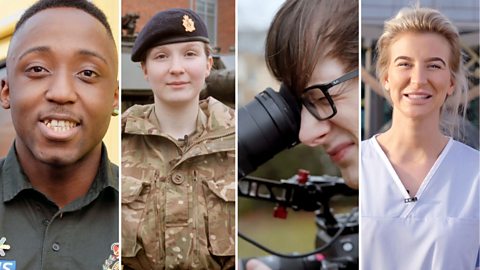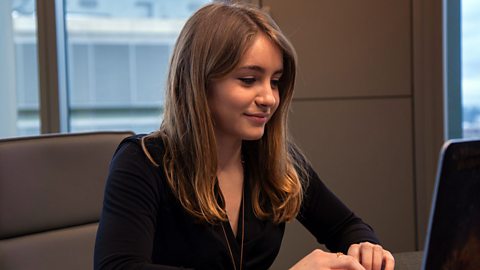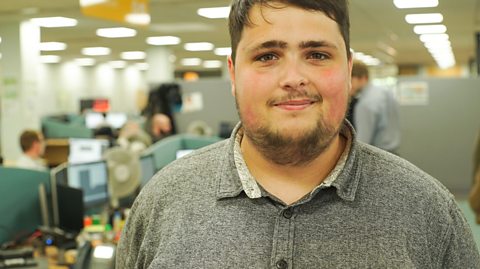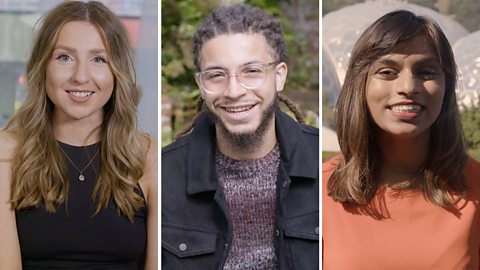To celebrate National Careers Week 2022, Bitesize Careers have put together a special panel to discuss careers in technology. What's it like to work at EA, TikTok and EMEC? Scroll down to find out!
Visit our Q&A panels collection where you can also watch career discussions on healthcare and science, media and journalism, sports, and music and arts.
Technology panel discussion with Rory Reid
Rory Reid talks to three people who work in the technology sector about what life is really like in their varied roles. They reveal their stories about how they got started, their personal experiences and challenges they have overcome, as well what the future career opportunities could be in their job sector.
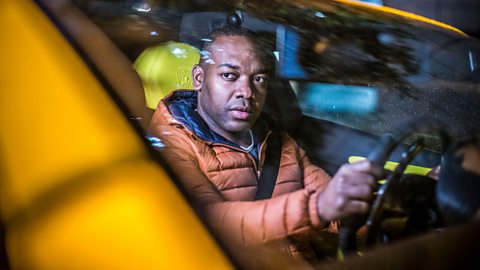
Rory Reid is a TV presenter specialising in motoring and technology. He has a degree in Computer Science and has presented a number of programmes including Top Gear.
Meet the panellists
Ana Couto
EMEC
Lottie Moor
TikTok
Siwan Owen
Electronic Arts (EA)
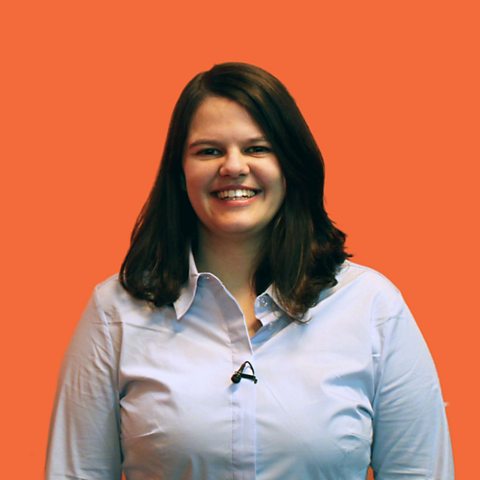
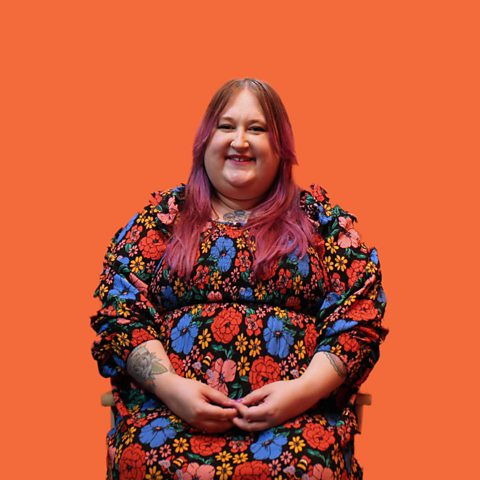
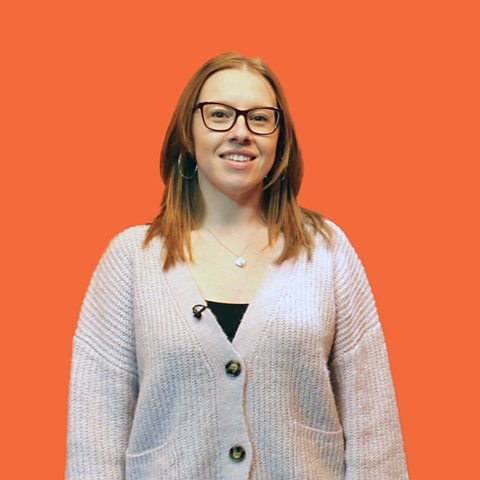
Intros and how it all started
- How would you describe your role?
- What sort of day-to-day tasks does your job involve?
- How did you get your career journey started?
Rory:
We're here today to discuss jobs in the technology industry. I have a degree in computer science. I've been a presenter on many a show, like Top Gear, Gadget Geeks, Fifth Gear. In 2020 I won an award for the best journalism film at the International Motor Film Awards. Fun fact: my dream car is a 1969 Chevrolet Corvette Stingray. Back in the day, astronauts drove them, and I always wanted to be an astronaut, but it's not just me joining you today. We have a bunch of great guests to help us explore various careers within the tech industry, so please welcome our fabulous panellists, Lottie, Ana and Siwan.Welcome guys, thank you for joining me.
Lottie:
Thank you.
Rory:*
You doing well?
Lottie:
Yeah, very much so.
Rory:
Good, why don't we start with, um, who you are and what you do. Lottie.
Lottie:
My name's Lottie. I'm a Marketing Manager for the UK and Ireland for TikTok.
Rory:
Good stuff.
Ana::
Hi, many name is Ana Couto, and I'm an Acoustic Engineer at the European Marine Energy Centre, or EMEC.
Rory:
And Siwan, who are you and what do you do?
Siwan:
Hi, I'm Siwan. I work as an Associate Development Manager at Codemasters, which is now part of EA games.
Rory:
Brilliant. All of your jobs sound really varied and interesting, but I wanna dig a little bit deeper and figure out exactly what you guys get up to.Lottie, everybody's heard about TikTok.
Lottie:
Yes.
Rory:
It's the big in-thing at the moment. Um, what exactly do you do there?
Lottie:
Um, so I'm a Marketing Manager, which basically means I get to create really incredible advertising campaigns by putting people on billboards, or on television campaigns, and really celebrate what TikTok is, and also the people that use it.
Rory:
What do you actually do, day-to-day, though? Is it all just making silly videos?
Lottie: Oh I wish. Um, no, it's really varied. Um, one day I might be writing a strategy for what we're going to be doing for the rest of the year. The next day I might be on set doing something incredible with our creatives and helping to put them on their names in lights really. But, um, it changes from day to day. There are some days where I have to have my head down with the, er, the facts and the figures, to really understand why we're doing what we're doing, but it's great. It's really varies.
Rory:
Brilliant. I think we've actually got a little clip of, er, what you get up to, so let's take a look at that.
(CLIP)
Rory:
Looks like people were making some, er, great content there. Can you tell us a little bit about VidCon and what you actually got up to there?
Lottie::
Yeah, of course. So that was VidCon 2020, so just before the pandemic hit. Um, we had this really incredible space, er, for our creators to come to and chill out, and make content, um, learn a bit more about TikTok. Er, we also ran a few of our industry panels, with people that work at TikTok, so people could understand more about the working life, um, and we threw a really great party afterwards as well, for everybody that went to VidCon. So, it was wonderful. It was a really good opportunity to get everybody together and celebrating what it is to be a content creator.
Rory: Where was my invite? I wanted to be there. (laughter) So what were your first steps in actually getting into your role?
Lottie:
Oh I went about it the long way round, that's for sure. Um, so I never really knew that I wanted to be in marketing, to be honest.Um, I left college quite early because I had a bit of a rough time in my teens, when I came out, um, so I had to change my plans a little bit when it came to education, um, and went straight into the world of work at about 17, 18 years old. Er, worked in a bunch of customer service roles, as one does when they're quite young, um, and then, er, started my own social media channels on the side.So started writing a blog, creating content myself, um, and that's where I realised that I was actually quite creative, and I really loved tech. Um, so I ended up looking for careers in the tech industry, and found, at the time, a little unknown app called TikTok, um, that I wanted to go and start at. So managed to get my foot in the door at TikTok three years ago, um, started off looking after some of the creators that use the app, um, helping them to get started, and realised I really missed the creation element and being really creative. So, um, made the move into marketing, and I've been there for about a year and a half now.
Rory:
And did you knock on the door at TikTok, or was there, er, an existing opening already? How did you actually make that step in?
Lottie:
Yeah. Um, there was an existing opening, but not in marketing, so I went into, er, the creator team, so looking after the creators, um, and then, whilst I was working with them and doing my own things on the side, realised that actually I'm pretty good at telling a story, and pretty good at selling a product. So, er, made the move into marketing.
Rory:
Fascinating. Cool. Ana, can you tell us a little bit about what you get up to, day to day?
Ana:
Yeah, so like I said, I'm an Acoustic Engineer to the European Marine Energy Centre, or EMEC for short. So if you don't know, EMEC is, er, tidal test - tidal and wave test facilities, so developers come to test their technologies up at EMEC. So I'm part of the environmental team, and what I do is to make sure that devices have no impact to the marine life, the marine species. So on a day to day I would go either try to develop a survey method, or go out in the sea collecting some data, or analysing the data and writing a report. So for example, if the developer comes to us and they want to how much noise their machine makes, then I would go out to the boat, collect data using hydrophones, which are underwater microphones, and then analyse the reports -, er, the results, and write the reports and providing the results back to - to them.
Rory:
Nice, I think we've got some pictures of you in action.
Ana:
Yes.
Rory:
Can you, er, talk us through what's happening here?
Ana:
Er, yeah, so this one is actually a picture from before I was working at EMEC, so that was when I was working at a research centre in Portugal, and back then I was working, er, in a project that involved, er, tagging sharks, to understand where they go, like what their movement is.
Rory:
That sounds dangerous.
Ana:
Oh it was fantastic, it was brilliant. (laughs) Er, so in that, er, picture we were practicing in the pool, so at the moment we were practising to, er, go tag a basking shark. So we were taking turns, one of us being the shark with a Styrofoam like fin and the other one would just go around and try to put the tag on them, so it was quite fun.
Rory:
And how do you actually get into that kind of job? How did you take your first steps into that industry?
Ana:
Er, so I actually like a very boring, traditional kind of, er, path, haha! I started as a marine biologist, so I did my undergrad as marine biology, and then I moved to, er, marine biodiversity and conservation Masters. Er, after that I start applying for, er, jobs, but I didn't got anything. I wasn't accepted anywhere. So I was lucky, I was able to move back with my parents at the time, so I started working as a volunteer, which was really good because I could develop some of the skills and then that led to getting, finally, getting a PhD and then start working more, er, in the industry.
Rory:
Nice. I think we've got some more photos here. What's going on here?
Ana:
Yeah, so here we were out at the sea. We were collecting acoustic data from one of our tidal devices. So we were just checking that everything was ok before dropping the hydrophones and then collect them again.
Rory:
We've got another picture as well. What's happening here?
Anna:
Er, here I am making sure that our hydrophones, which is basically underwater microphones, are actually 'on' before we chuck them into the sea for two weeks, to make sure that we actually have data when we bring them back. (laughs)
Rory:
Very important.
Ana:
Yes.
Rory:
Brilliant. Thanks for that, Ana. Er, over to you, Siwan. Can you tell us, er, a little bit about what you do, day to day?
Siwan:
So, I work with the development team, um, and we help artists, programmers and designers, create video games and we will work with them on a space where we'll help plan their - how to make a video game, over the length of maybe two to four years. It's also known as a producer as well, in other studios. Um, so we will help to, er, spot risks, and, er, and block people. But, um, the main kind of framework that we use is a framework called Scrum, and this is like quick, rapid meetings that only last about ten minutes, and it has - it gives the development team a chance to come to us and tell them what they worked on yesterday, what they're working on tomorrow, and where they're blocked. So my team, the development team, will help unblock them to, fingers crossed, make the best game ever.
Rory:
It sounds like fun, like being in an office where you create video games. Is it all fun and laughter all the time, or is it quite serious at times?
Siwan:
It is fun, of course it is. You're in a creative process, so working a mixed bag of people, personalities, you've got artists, you've got coders, you've got designers, everyone thinks differently but the main - the main goal is that they wanna create an - an amazing experience for people. Um, it can get pretty stressful. Er, deadlines to meet. I can imagine when it gets to that level, you know, er, it is a bit stressful, but yeah, it's just so rewarding, you know, meeting artists that have an idea - people that have an idea and then a collaborative effort to make that come to life is - is great.
Rory:
Fantastic. I think we've actually got some pictures from Dirt 5, which you worked on. Let's take a look at that. I love my racing games as well. Um, is this one that you're especially proud of?
Siwan:
Yeah, so actually it's been a year this week that I started at Codemasters, er, in Cheshire, and this was part of the live service, and, um, the game itself is just so vibrant. Compared to like previous Dirt games, they're quite technical, you know, you have to turn the corner at a certain speed and stuff like that, whereas Dirt 5 you can just go crazy. And, um, I think one of my favourite tracks is the Rio, er, Rio de Janeiro track, um, in the daytime, and in the night time, because it's just crazy. Like what - what artist can do with lighting as well is just step above what they could do five years ago. So tech is moving constantly.
Rory:
Do you have to be good at games to get into your - your field or?
Siwan:
(laughs)
Rory:
Are you - are you always winning against your friends?
Siwan:
Ask me how many games I’ve completed in the last like five years. Um, I think - so I come from a - an art and design background.That's like my educational background. I did a degree in Art and Design, and I kind of wanted to go down the path of being like an art producer, cos I have a passion for that kind of process. But I appreciate the creativeness of a game. You don’t have to be good at it. You can just like a character, or like the music, or like the gameplay and just get stuck in, I suppose.
Rory:
And I'm sure a lot of people watching this will have this exact question on their minds. How do you get started doing what you do in the games industry?
Siwan:
Er, mine was not the traditional path, a bit like you. (laughs) So I wanted to be a car designer to begin with.
Rory:*
Oh wow.
Siwan:
Yeah, um,
Rory:
I wanted to be in games.
Siwan:
Oh! (laughs) Yeah, I wanted to be a car designer. Um, I used to drive cars round my dad's fields when I was like 13, and then I realised I could draw, I was like I'll just be a car designer. Um, I got into Coventry Uni to do automotive design, turned round, realised I wasn't an engineer, really bad with numbers [laughs], and, um, yeah, and then I went back and just did Fine Art. Um, however, I went into the event management, er, route, where I did, er, where I hosted creative and tech events, which brought me to Manchester, and that opened up, um, networks to the Indy Games Network. So I got to know a lot of small, independent game studios, and one of them approached me and said look, you've got transferrable skills here. Your organisational skills, you could be a producer. So they took a chance on me, which is very rare, and I really appreciate to this day.
I appreciate the creativeness of a game. You don’t have to be good at it. You can just like a character, or the music, or gameplay. You can just get stuck in.
Siwan
Careers experiences
- When you were in school, what did you dream of becoming?
- Which subjects in school helped you to be innovative in your career?
- (How) are you able to bring your personality into what you do?
- Have you had any challenges in your career? How did you overcome them?
- What are your career highlights?
Rory:
I think we should probably re - rewind a little bit and have a look at where I got started. Here's a little picture of me, on the old London Underground. (laughter)As a kid, I think I - I had so many different interests. I wanted to be an astronaut, a fireman, um, but one of my major passions was always technology, and specifically games. And there came one point when I was reading a - a video games magazines, and I thought to myself there are people out there who actually get paid to play video games and write about them, and I realised that, um, one of my very few talents was writing, um, and I wanted to become a journalist and actually write about my passions. So, I ended up working for a website where I wrote - I reviewed games. I, you know, I reviewed stuff from Codemasters, for example, um, and I started doing presenting in front of a green screen. And I did that for a few years, really enjoyed it, and then I thought, what other passions do I have? What can I write about? And, you know, I also love tech, computer hardware and software, and I ended up writing for a magazine for a few years, just reviewing computer hardware and software, mobile phones, every gadget you can think of under the sun. And then that evolved into another passion of mine, which is cars. And I thought I love cars. Why don't I write about cars? And I started writing for a website about cars, you know, doing videos on YouTube about cars and it ended up, um, kind of snowballing from there. I ended up presenting the world's biggest car show, Top Gear, Fifth Gear, I do the Autotrader YouTube channel, so it's amazing how, you know, the smallest passion - if you can hone in on that, um, and harness that passion, um, you know - the sky's the limit, as all you guys have proven today.Um, so panellists, how about you? What did you wanna be when you grew up? We'll go back to you, Lottie. When you were in school, what were you dreaming about becoming?
Lottie:
Do you know what, I had no idea what I wanted to do when I was in school. Um, I don’t think I figured that out until I was in my 20s.I just - I knew that I had passion for creativity, but I just didn't know how to harness it. I didn't know what to do. Wasn't very good with a paint brush, couldn't paint. Can't sing, can't dance, so tried to figure out, er, where my creativity could come from and yeah, it took - it took until my 20s to do it, but I - when I was at school I really loved writing and I loved English language and literature, so that sort of gave me a little bit of an insight into creativity too. So I was a bit of a - bit of a writer, like you.
Rory:
Nice, nice, and Ana, what did you wanna be when you grew up?
Ana:
I actually wanted to be a marine biologist, since a very young age, and watching all those BBC documentaries about like all the ocean life was just fantastic and that's what made me want to be a marine biologist. However, what I thought I will be doing as a marine biologist, and what I actually do, is very, very different. I imagine like a life of glamour, being in the sea with the animals, swimming. It's not what I do. Most of the time I just spend, er, sitting on my desk, analysing data, writing code and doing statistics and that's pretty much it. I love what I do, which I didn't know before, so I kind of found out that as my career progressed, but it was quite different, as what I imagine I would imagine I would be doing when I was 15. (laughs).
Rory:
And Siwan?
Siwan:
Well like I said before, I wanted to be a car designer, cos I went to college to do Art and Design and I had a passion for cars, so I was kind of - I went down the kind of product -, er, product, er, design pipeline, but then realised that it wasn't - I tried it and it wasn't want I wanted to do. It wasn't grabbing me like Fine Art, and Design did when I was at college, so I went back and did Art and Design as a degree. And I - my first job was, er, running an art gallery, er, which was - straight out of uni, which was, er, which opened my eyes to event management and obviously led me to here. Games.
Rory:
It's interesting, isn't it? Everyone has different passions, but we've all kind of ended up in the world of tech, um, by some quirk of fate, isn't it?
Siwan:
Yeah.
Rory:
Now many of our audience will soon be taking their GCSE and National Five exams. Thinking back to the GCSE subjects that you did, Lottie, are there any that were particularly important in helping you to be innovative in your career?
Lottie:
Yeah, I mentioned it before that, um, English and, um, language and literature were my favourites and there's a good reason for that.I think it's probably learning how words work and how best to speak to different audiences. That really helps with marketing.And as much as I hate to admit it, because it was my least favourite subject, maths is so, so important for marketing.You spend a lot of time in with data, a lot of time learning how to spot trends, how to, er, read graphs, how to read, um, pages and pages of analysis, so maths really, really helped with that. And I think without studying that at GCSE level, I don’t think I would have been able to have my job in marketing the way that I have it now.
Rory:
It's interesting, isn't it? Doing TikTok you might not think being focused on maths or English literature would have been that useful, but clearly it is very useful. Ana, is there any particular subject that you found helped you to be innovative in your career?
Ana:
Er, I - I wish I had paid more attention to physics class as well, cos a lot of what I do requires understanding of physics, er, but also, at the time, er, when I was growing up, there wasn't a programming, er, er course at the school and I think now they have some with programming courses as well. So that would be incredibly useful, er, to - to have, because it just gives you a head start when you are - and you end up by doing a lot of programming in a variety of disciplines, including marketing as well, and games. (laughs)
Rory:
And Siwan, what did you love studying in school? What was useful for you?
Siwan:
Well my favourite subject was Art, and, um, I did enjoy all my GCSEs, to be fair. I feel like every one of them contributed in some way. Like I loved History, I loved Environmental Science, um, and - but yeah, Art was the one that has been a constant in a lot of my roles. Like the - I've always worked in a sort of creative industry, so that has been the constant. I think I would have - I would have loved to have paid more attention in Maths. I think if they would have given me examples, like your role, or your role, or even my role, you know, in - in my Maths classes, maybe it would have grabbed me a bit more. But yeah, Art was the one for me.
Rory:
Great stuff. Now on the BBC Bitesize website there are tons of videos and explainers for all subjects that you study at school, and it also now has personalisation, so you can log in and track your progress with revision and smart quizzes. So make sure you go and check that out.Now guys, you might think you have to be loud and outgoing to be successful in the workplace, but there are people who are quiet and organised, who end up being just as successful. I wanna know what kind of personalities you guys have, and how that helps you in your career. Lottie, let's start with you.
Lottie:
Well, er, I asked my workmates this actually, before coming, um, and they say I'm the bringer of good vibes in the team. (laughs)I tend to be the person that brings, er, everybody’s like everybody’s feelings up if the to- if the going gets a little bit rough. I'm always the first person to send a funny video in the group chat as well, just to raise people's spirits. Um, but I'm also really passionate about diversity and inclusion, so I make sure that everybody on our team, regardless of their background, who they are, who they love, how they identify, um, has a voice on our team. So I'm really good at lifting people up and making sure that, um, everyone has the same steps to opportunity as anybody else on the team.
Rory:
Good. And Ana, what's your personality and how does that help you in your career?
Ana:
I guess one of my main traits is I am very enthusiastic about what I do. I love what I do, so I'm very enthusiastic about that.I'm also very aware that I don’t know everything, and I always try to keep up, like learn new skills and - and, um, improve myself, which quite helps. Sometimes it can be a bit, er, rough, or can take quite a lot of time, but I'm also quite determined, which helps a lot. And I - I guess one of the main things is I don't get easily defeat when things don't work because that happens 90% of the time, and just like make the best of what we - you have, I guess, I would say that.
Rory:
Perseverance. Nice.
Ana: Yes. (laughs)
Rory:
And Siwan, what do you bring to the table?
Siwan:
Um, I think I've definitely learnt a lot about myself in this role. Um, I've learnt to kind of take a step back and be patient and dealing with a variety of personalities, you know, I deal with about 50, 60 people a day. Um, you have to be patient and you have to have a sense of empathy for people. You know, we're not machines, we're human. So, um, organisational skills obviously are a big thing.Um, but yeah, I think wanting to succeed in what you do, you know, is a - is a core, you know, it's like your core of the job as well.But I think the - the big thing I've learnt is empathy. Yeah.
Rory:
Very useful. And working life isn't always plain sailing. Sometimes you're gonna encounter problems and, you know, downsides to every situation. Can you tell us a little bit, Lottie, about, um, an environment or… an example of when you might have encountered any difficulties in your career and how you got around that?
Lottie:
Yeah, for sure. I mean I said before like my route into the working world was a little bit different to everybody else’s, but I think my biggest issue has been my own ego. Um, it's, it's been a bit of a learning process for me to learn to fail, I think, is probably the biggest way, er, the best way of saying it. Um, I've been very afraid of failure in the past, um, but once I tried to figure out why I was afraid of that failure, I actually realised that failure opens a lot of doors to opportunity, and it's all about how you frame, your frame of mind, when something goes wrong. It's not necessarily telling you that you've done something wrong, but just telling you to go down a slightly different path. So I think learning about my ego, and how that affects the way that I work, was a really big challenge for me.
Rory:
Yeah, it's okay to get things wrong sometimes.
Lottie:
Oh yeah, absolutely. It often gives us the biggest opportunities in life when things go wrong.
Rory:
Yeah. And Ana, um, any examples of some tough times that you've encountered?
Ana:
Yeah, I would say my grades. I didn't have the best grades, er, when I was in school, and as well in my undergraduate, and that if you want to do a career in more like academic, er, field then it can be a major setback. So I had to go the long way, which meant like learning a lot of transfer - transferrable skills in order to kind of like overcome the lack of good grades. So that was mine.
Rory:
Siwan, any tough times? It's all playing video games though, isn't it? How can that be tough? (laughter)
Siwan:
How much time have we got? (laughter)Um, I've been in roles where I've been made redundant. I've had to leave positions because there was no career progression. I've had to take pay cuts. It's all led me to here. So, and you know, you can look at these as oh my god, I've failed. This is - and - and at the time it feels like that. 'Aagghh'(!). But, um, yeah, there's always another opportunity around the corner. That's, I think that's the best thing I can say really.
Rory:
How important is it to be resilient?
Siwan:
It's - it's we - like nobody else is gonna do it for you, you know, you have to push, you know, you have to push yourself really, and I know it sounds pretty harsh but look at it as an experience. You will definitely learn from it. You won't do it again. And if, you know, you'll - there's another opportunity. Someone will hire you because you're obviously good at what you do, and it'll - it'll happen.
Rory:
And on that subject, we've obviously talked about the bad times, let's - let's lighten it up a bit and talk about the good times.(laughter) Any career highlights for you so far, Lottie?
Lottie:
Oh yeah, absolutely. So there was, um, it was actually my first campaign I worked on as um, marketing manager and it was called 'It Starts on TikTok', um, and it was all about highlighting some of our incredible creators that were just sort of starting their journey.Um, and actually there was somebody that we put on a - a billboard in Manchester just down the road from where we are now, um, and they filmed themselves seeing their billboard for the first time. And it was the moment that I realised that this isn't just about selling a product. This is also about how it affects the people that use the product, and knowing that these people went to go and see their billboards and got so much joy and recognition from seeing themselves there, was just the icing on the cake for me.It was the - the moment that I was like: this is the industry I'm supposed to be in. I'm supposed to be here right now, doing this.Um, so I still watch that video back when I've had a bad day, just to make sure that I'm remembering, like, why it is that I'm doing what I'm doing.
Rory:
That's important isn't it?
Lottie:
Yeah.
Rory:
Definitely. And Ana, any, er, career highlights for you so far?
Ana:
Yeah, I would say I have two. Like the first one would be tagging a basking shark, because that was
Rory:
I was gonna say, yeah.
Ana:
Yes, that was kind of like fulfilling a childhood dream. It was fantastic. Er, the other one would be, er, like when people talk about marine renewables, I talk about like climate change and how the seas is gonna help, er, like just changing the world and like knowing that I'm a part of that makes me really proud to be just involved in that field. And so that's - that's really good.
Rory:
And Siwan, any career highlights for you so far?
Siwan:
Um, so one of my first roles when I joined the indie studio that took me on, er, to be the assistant producer, was to engage with local universities, er, in game design. And I reached out to, I think it was Bolton Uni, and I got all the heads of the departments, so the lead artists, the - the lead designer, we all went to visit the, er, Masters, the MA show, and there was a guy there, he'd just finished his MA and he was presenting the game that he'd created for his masters. He got a junior designer role with the studio, and it was the first junior designer, or junior that the studio had hired, cos it was only a small studio. And now he works for an even bigger company as a designer. That engagement with the universities and stuff is, er, something that I've always been proud of because it's nice to see that progression, and we're still in contact now. He's always commenting on my LinkedIn and stuff like that. But it's great to see that ok, me communicating with that university and, you know, opening up a - opening that channel, has led to this, so yeah, that's one of my highlights, yeah.
Rory:
Good stuff. Some fascinating insights there.
It’s all about your frame of mind when something goes wrong. It’s not necessarily telling yourself you’ve done something wrong, but telling yourself to go down a slightly different path.
Lottie
Future of the sector & audience Q&A
- What are the future career prospects for your industry?
- What advice would you give to your younger self?
- What entry level roles are available in your industry?
Plus our panel answer questions sent in by the Bitesize audience.
Rory:
It's such a fast-paced world that we live in at the moment and I think a lot of our jobs probably wouldn't have existed a few years ago.Lottie, can you tell me about what you think is in store for your industry in the next couple of years when people out there looking for jobs might actually start to move into your industry.
Lottie:
Oh yeah absolutely. I think the thing that I'm most excited about is the metaverse. I feel like that's like the number one thing that people talk about in tech at the moment is the metaverse. And just understanding how we're going to be able to interact with each other on a virtual level in that kind of environment I think is gonna be really exciting for marketers, and understanding, you know, how marketing can evolve into those kind of areas. I'm also really interested in the creator economy, digital creator economy, so how people that use things like TikTok can understand how they can make money from doing what they do, so, I think that's gonna be the next iteration of what, um, what TikTok is gonna be anyway, and definitely the tech world, for sure.
Rory:
So we could be having this chat with, via our headsets in the future.
Lottie:
We could, yeah, we could. (laughs)
Rory:
And, Ana, what's in store for your industry?
Ana:
So marine renewable energy, although it's still quite a fairly recent industry, it has the potential to, to provide energy, 20 per cent of the UK energy demands. So, so far we've seen like very small devices being deployed but I think in the next ten years for sure we're gonna see like big arrays of the devices being deployed and then increase the energy that comes from such renewables.
Lottie:
Wow.
Ana:
Yeah, it's fantastic.
Rory:
Yeah, no, that's definitely a big, big evolution. It's gonna play such a big part in all our lives I think in getting renewable energy.And Siwan, what does the future of gaming look like?
Siwan:
Um, I'm not sure is the simple que- is the simple answer. So gaming is like, the industry itself is bigger than film and, you know, TV combined and, I'm like you, the metaverse kind of, and what's gonna happen there, we could be having this conversation via our headsets maybe, driving around in a Codemasters game or something but I would love to see games be used more in gaming - gaming(!), in education - and teachings. Um, I think that would be really, really interesting.
Rory:
Cool, it's been fascinating learning about your careers so far, but you've obviously made it to where you are today, and drawn on a wealth of experience over that time. Is there any advice, Lottie, that you would give to your younger self about how to get to where you are now?
Lottie:
Yeah, I think I'd tell 'younger me' that it's okay if things go wrong, and if the plan doesn't go to plan. Because actually that's gonna end up being the best thing for you because you'll get to say yes to any opportunities that come your way, you get to find out about lots of different industries and find your path in the world just by learning on the job and doing things on the job so, I think yeah 'younger me' needs to not be so afraid of failure, that's for sure.
Rory:
And Ana, what would you tell teenage Ana?
Ana:
Actually my first advice would be very similar to Lottie's advice which is like failure does not mean that you're good enough it doesn't reflect on you as a person like you're gonna fail a lot of times but it just means that probably wasn't the right opportunity or that there's still a lot more learning to be done. But it does never mean that you're not good enough and sometimes it's really easy to just mingle both of them together and, yeah so exactly like that, just like how to deal with failure - failure a little bit better. And I think another one is maybe, it's okay to change career paths as we just spoke here today like it's okay if you don't know just yet what you want to do like, there's still time to figure that out and the more transferable skills you learn the easier this path is gonna be and this transition is gonna be.
Rory:
And Siwan, any advice to your younger self?
Siwan:
Agree and agree completely, um, definitely. And I think I would just say to surround yourself with people that want the best for you, because it's easy to - when you're, you know, if you're surrounded by maybe a negative vibe or anything but, you know, you want to be surrounded by people who want the same thing as you or want to see you grow. So that's my final bit on that.
Rory:
Some great advice there. Okay let's move into our Q&A section now. We've had some brilliant questions sent over in advance from our fabulous audience members. The first one is from Lucy, and this one is a question for you, Ana.
Lucy:
My name's Lucy Clay I'm asking a question for EMEC. I'd like to know what is your favourite part about your career?
Ana:
I think I already answered that a little bit but I would say like well, tagging the basking shark was fantastic but knowing that I'm part of making the world a little bit better by working on marine renewables I think that's the highlight of my, my career path.
Rory:
Great, thank you for that, Ana. And now we have a question for Lottie from Thomas.
Thomas:
Hi, I'm Thomas Conroy. As 2021 has finally ended, what was your best part of the year?
Lottie:
Oh wow by best part of 2020 - 2021 should I say, um… I had two things that happened in 2021 that I was really excited about.One was starting our LGBTQ Employee Resource Group, alongside my usual day job I also am a co-president of that. So starting that from the ground up and helping with some real, um, representation within our business was really incredible. And also work that we did on Black History Month last year was really important to me. We had this really incredible music event for our black creators and our black music artists and it was just really wonderful to see communities come together to celebrate our black creators.
Rory:
Good stuff and, finally a question for you, Siwan, this one's from Maddox.
Maddox:
Hi I'm Maddox Fudge. I understand that getting into the video game industry is exceptionally competitive. What did you do to set yourself apart from everyone else?
Siwan:
Okay. So obviously like I've mentioned my path wasn't the traditional path. Usually producers start off in like QA, testing the games and then they work themselves up but, I'd like to think that my exposure to different gaming events and communities when I worked in event management gave me an alternative path basically into the industry, and if - So I would recommend just attending as many events as possible online or in person, cos there are a ton. Joining every single kind of community platform so Discord, Twitch, even, you know, following YouTubers. And, collaborating on projects with people. You know, you could be a writer, you could be an audio designer, you don't have to be a programmer or an artist, you know, you just collaborate with someone on a project and see where that goes, doors will open.
Rory:
Thank you, guys. Now obviously you guys are at a very high level where you are and not everyone can start on your level but can you tell us what entry level roles are available in your industry?
Lottie:
Yeah sure so for marketing in particular, if you're coming from a university degree, then there's a lot of marketing graduate schemes that you can join to become part of the marketing world. But if you're coming from a different point of view that isn't university, you can look for marketing executive roles, or marketing assistant roles, that will really help you to get your feet in the door. But for me I did lots of different things and had lots of transferable skills so, I got my foot in the door with the company I wanted to be at, and then just transferred myself across once I'd gained all the skills I needed, so yeah.
Rory:
And Ana, can you start off straight away tagging sharks or do you have to start somewhere else?
Ana:
I wish, er, we had to practice in the pool first! (laughs) No, working with marine renewable like you might think that it's more like a career for engineer or a scientist but actually it's not, there's a lot of like different disciplines. At EMEC there is, like, teams from marketing all the way to finances and, and the environmental team which I'm part of. So there's a lot of wide options and we also provide internships as well so it's also quite a good way to start.
Rory:
And Siwan, how do you get started in the world of computer games?
Siwan:
So in my role at the moment a kind of traditional pipe, er, path through to producer is to start out in QA. Quality Assurance is where you test the games, find all the bugs. It gives you a real like overview of how a game is made and what problems can arise and stuff like that. But I skipped that part, and went straight in to entry level, as an associate development manager. So the skills that I gained from event management, organisation and all that sort of stuff I transferred over. So at the moment I am actually in an entry level position, which I have been for a year now so, fingers crossed, the only way is up.
Rory:
You make it sound interesting just playing games for fun that sounds like an ideal job for literally anyone.
Siwan:
Well you have to literally break, try and break the game. So, a lot of people get really frustrated cos they have to play over and over again but at the same time it gives you a real overview of how to break a game really, yeah.
Rory:
I'll send you my CV. (laughter) Thank you, guys. So that brings us to the end of our session. I hope you found it interesting hearing from our guests about all things tech-related. Just a reminder that BBC Bitsize is here to help you when it comes to working out what career might be for you, as well as with exam and revision support. Sign up today, and get a personalised experience and thanks again for everyone who watched.
It’s ok to change career paths, or not know what you want to do. The more transferable skills you learn, the easier the path will be.
Ana
For teachers
Watch the full technology Q&A panel below. For advice on how to get the most out of Bitesize Careers resources in your classroom, head over to BBC Teach.
Careers in technology
Hear from other young people working in the technology sector about what their roles involve and how they got to where they are today. Learn more about the sector with key facts and figures about current and future opportunities.
Where next?
How can you use Bitesize Careers for National Careers Week?
Expert advice on how to get the most out of Bitesize Careers resources in your classroom.
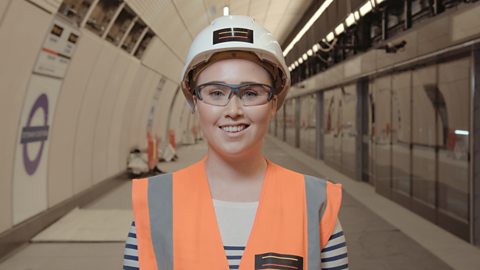
Explore careers by job sectors
Looking for job inspiration? Check out BBC Bitesize Careers job profiles to help you get started.
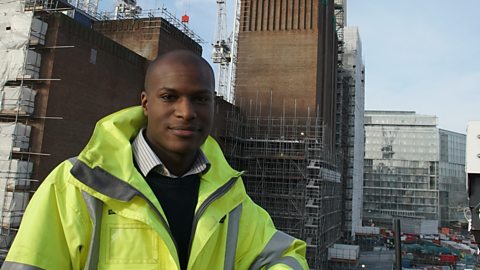
More from Bitesize Careers
Hear from young people about the world of work.
